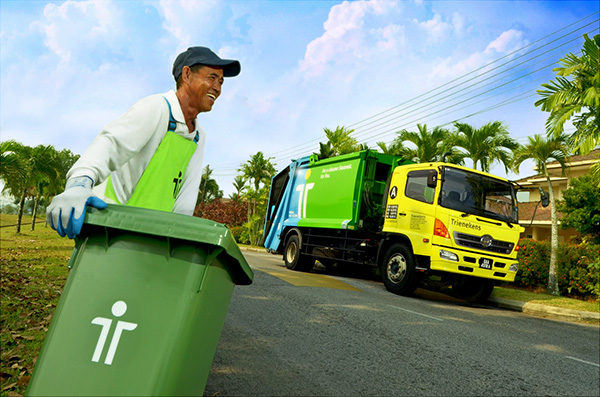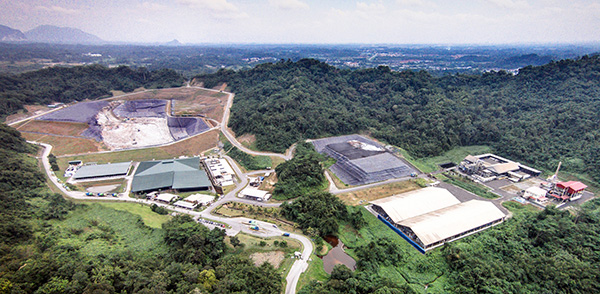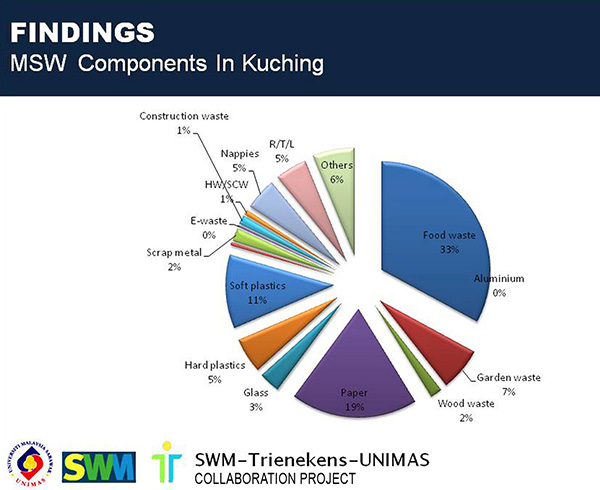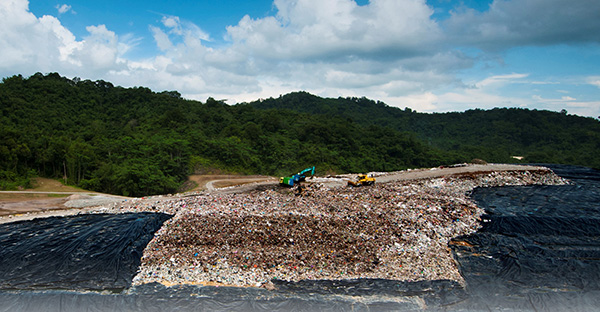
A worker collecting municipal household waste in Kuching.
JACK (not his real name) normally packs his household waste into a large plastic bag after every meal and throws it into the Kayan River which passes through Kampung Krusen since there is no proper waste disposal in the village.
His family of seven, comprising his elderly parents, three nieces and a nephew, generate more waste in the evening when his three nieces normally join the family for dinner.
Since the three girls are at school on weekdays, Jack would throw less rubbish after lunch.
He is aware what he does is wrong but has no other choice as there is no proper waste disposal in his village.
“I may not be highly educated but I know what I’m doing is wrong because it’s contributing to river pollution and will impact negatively on our environment.
“And I realise what I’m doing can adversely affect our river which we still depend on for our livelihood. We still catch fish and snails, and sometimes even get our water supply from the river when our tap runs dry. But what choice do I have because now we don’t have any proper system to dispose of our waste,” he lamented.
Jack and many of his fellow villagers, together with those living along the Mongkos Road, are living outside the periphery of Serian District Council’s (MDS) waste disposal coverage.
Kampung Krusen is a cluster village, consisting of Kampungs Krusen Siyu, Krusen Mawang and Krusen Kranji, and located about 15km from Serian town.
There are more than 200 families in the three kampungs with a population of over 1,000. Like Jack, most dump their waste into Kayan River while some throw theirs into common pits.
Realising how serious the issue of waste disposal is to them, the people in three villages recently created a WhatsApp chat group, comprising educated individuals and members of the Village Security and Development Committee (JKKK), to see how best problems affecting their villages can be tackled, including the pertinent issue of waste management.
“The WhatsApp group is really helpful as we can discuss matters affecting the villages and how we can improve ourselves. Through discussions and brainstorming, the villages have jointly forwarded to MDS their suggestion on solving waste management,” Jack revealed.
MDS was duly informed of this by the JKKK members.
On Wednesday, MDS Public Health and Environmental Section chief, Thomas Ramli, revealed to thesundaypost the good news — that starting January 1, 2017, MDS would provide proper waste disposal bins for Kampung Krusen and the villages along the Mongkos Road.
He said the three Krusen villages would receive 12 (1,100 litres) bulk bins and MDS would collect the waste three times a week, adding that the 12 bulk bins would be distributed equally among the three villages of Kampung Krusen.
“We’ve been fighting for Kampung Krusen and the rest of the villages to be provided with proper waste disposal. And we are thankful the council is finally able to so, starting next year,” Ramli said.
He added that MDS had been educating the people, especially students in the district, on the proper ways to dispose of their rubbish and take care of the environment.
“We’ve been moving around the villages and schools in Serian District for the past three years, primarily to educate the people not to throw their rubbish into rivers which are their source of livelihood.”
The issue of waste management in Serian as well as the rest of the State is not something new. In fact, it has been highlighted umpteen times by the local media, including The Borneo Post Adventure Team (BAT) initiative. The government has long acknowledged that waste disposal is one of the main issues that needs urgent attention.
According to Natural Resources and Environmental Board (NREB) controller Peter Sawal, on average, each Sarawakian generates 0.8kg of waste every day.
He said NREB studies, conducted last year, showed that based on the state’s population of 2.8 million, about 2,187 metric tonnes of municipal waste were generated per day — meaning Sarawakians are generating some 798,255 tonnes of waste annually.
“In 2015, about 2,187 metric tonnes of municipal waste per day were collected and landfilled in Sarawak — that is each person generating about 0.78kg (2,187÷2.8mil population x 1,000kg) of waste per day,” Sawal explained.
He said in principle, the more advanced the society, the less household waste it would generate.
However, he pointed out that now, only between 60 and 65 per cent of Sarawakians in urban and semi-urban areas had proper waste disposal systems whereby the waste is dumped in proper landfills by the respective local councils.
The remaining 35 to 40 per cent, generated especially in rural areas, unfortunately could not be accounted for. Most probably, the waste would be disposed of somewhere and it’s common knowledge the refuse would be thrown into rivers and streams as in the case of Kampung Krusen.

Aerial view of the Kuching Integrated Waste Management Park near Mambong.
Kuching city as a model
Kuching city dwellers can consider themselves lucky that their household waste disposal has been managed by Triniekens over the past 16 years.
Comparatively, Kuching is now considered one of the cleanest cities in the country.
According to Trienekens Landfill manager Julius Salok Kassy, most of the waste collected by the company is food or kitchen waste which constitutes the most common household waste. Other waste materials consist of plastic materials, construction materials and garden waste.
On average, Trienekens collects about 500 tonnes of household waste every day from the three local councils — Kuching North City Hall (MBKS), Kuching South City Council (DBKU) and Padawan Municipal Council (MPP).
The waste is properly managed at Trienekens’ 112-hectare sanitary landfill — the Kuching Integrated Waste Management Park (KIWMP) — near Mambong.
Household or municipal waste will be brought to KIWMP for disposal by the compacting method. On average, Kuching generates a total of 200,000 tonnes of municipal waste annually.
“We started operating in 2004, and till today, have collected 2.1 million tonnes of waste. With new housing areas and new industries coming up, there has been a stark increase in waste disposal since three to four years ago,” Salok said.
He pointed out that during fruit season, the daily waste may also increase sharply — from the average 500 to 1,000 tonnes.
As for toxic waste, there two ways of disposal — through secure landfills or incineration plants. In both cases, permission must be obtained from the Department of Environment which will set the guidelines.
Salok explained waste such as human tissues and syringes from hospital were classified as ‘bio hazard clinical waste’ and would need to be disposed of via the scheduled waste incineration plant which also clears industrial waste.
As for other hazardous waste not suitable for incineration and ashes from scheduled waste incineration facility, they will be disposed of through secure landfills.
“For example, clinical waste comes with a consignment note and we will dispose of it accordingly,” he added.
To make Kuching a more livable city, Salok advised the people to use the green wheelie bins provided by Trienekens but cautioned they should not use the bins for any other purposes.
“Initially, as we have discovered, some residents considered the bins too good for collecting waste. So they kept the bins for storing water or rice and used other types of containers to collect garbage. I have advised them not to do that because if you don’t use our standard bins, our staff will not be able to put the substitute containers on the trucks to clear the garbage.”
Salok also suggested the people segregate, pack and tie the waste properly in plastic bags.
And for households wishing to dispose of sizeable waste such as discarded furniture or construction materials, he said: “Contact us. We can come over and collect at reasonable rates.”
He assured that during festive seasons, especially Chinese New Year, Gawai Dayak and Hari Raya, Trienekens would provide extra bins for Kuching residents in some housing areas to dispose of sizeable garbage as well as excess waste.
“To keep Kuching clean, we all need to play our part. Avoid illegal dumping to keep our environment clean.”
In a study conducted by Sarawak Wastes Management (SWM) — Trienekens and University Malaysia Sarawak (Unimas) as a joint research collaboration, led by Rebecca David Musa, in November 2010, and titled A Waste Characterisation Study in Major Towns in Sarawak, the findings arrived at are shown in the chart provided (see pix).

Chart of the findings of a study conducted by Trienekens and University Malaysia Sarawak (Unimas) as a joint research collaboration, led by Rebecca David Musa in November 2010, and titled A Waste Characterisation Study in Major Towns in Sarawak.
Total amount of waste
Trienekens provides the collection, transportation and disposal of municipal household waste in areas under DBKU, MBKS, and MPP. An average of 500 tonnes daily are collected from the three local councils.
School recycling programme
Where ecological conservation is concerned, Trienekens believes environmental education is an integral step to creating a deeper sense of care among today’s youths in preserving the environment for future generations.
The company runs a special solid waste segregation project for selected schools in Kuching, introducing the 5Rs (Reduce, Reuse, Recycle, Rethink and Repair) concept to participants of its the recyling programme.
Additionally, the programme aims to inculcate habitual sorting of solid waste at source by engaging both students and staff to practise segregating their school waste from the point-of-generation.
Meaningful and creative activities further encourage hands-on practice of the 5R principles as the recycling programme includes a year-long calendar of environmental educational events, ranging from seminars, workshops and contests for all active programme partners.
The project’s main partner is the Padawan Municipal Council. Most of the participating schools come under the Council’s jurisdiction. They are SK Matang Jaya, SM Sains Kuching, SJK Chung Hua Sejijak, SK Siburan Batu and SK Green Road.
Trienekens’ Group general manager for Business Development, Elvin Wee, thanked the participating schools and project committee for their dedication, saying: “This long-term project instills real commitment in both parties, especially with the increasing flow of new graduates. That’s why it is so pleasing for us to work with schools genuinely interested in increasing ‘green’ awareness. We want to play an active role in educating today’s youth and hope recycling will one day be a part of the national education system, shaping a new generation that is ecologically conscious and responsible.”
Conclusion
According to the Urban Wellbeing, Housing and Local Government Ministry, Malaysians, in general, produce a daily average of 30,000 tonnes of waste, only five per cent of which is recycled. So the remainder is dumped on landfills throughout the country.
So to make the environment cleaner, everyone must play a proactive role to ensure the disposal of waste will not pollute the environment.
In most developed countries, waste will be segregated into various categories or components before the degradables are processed by incinerators. This way, pollution is kept at minimal level as most of the components are actually recyclable.
As Salok put it: “If we are to become a developed country, we should be more aware of how to take care of our environment. After all, we have only one planet we all called home.”

